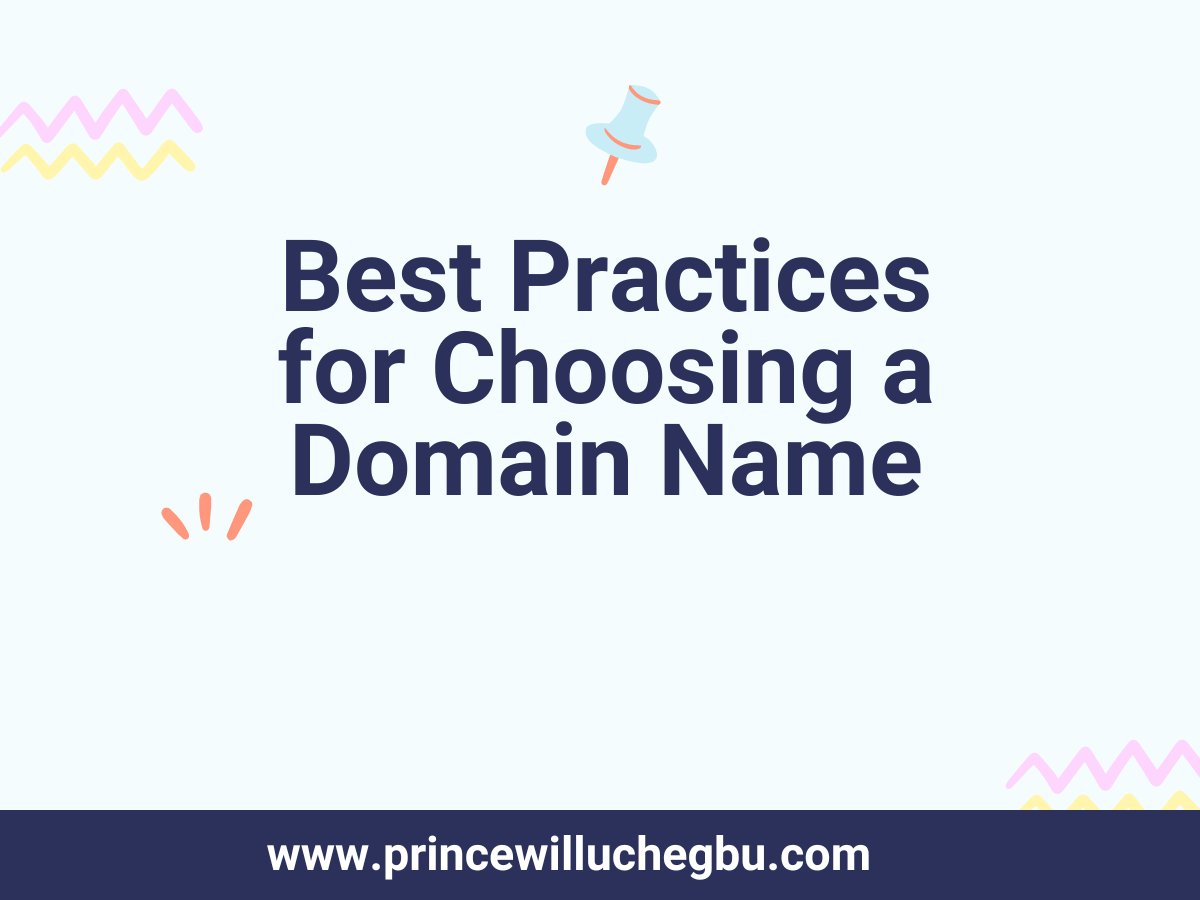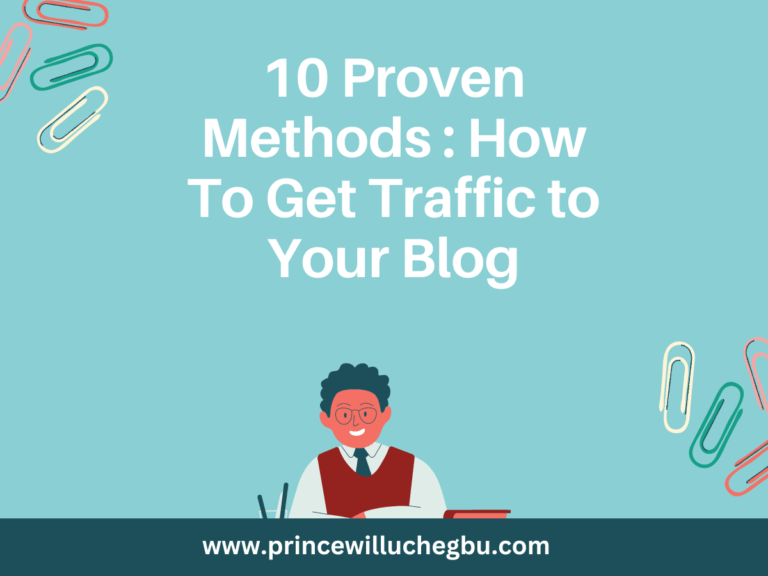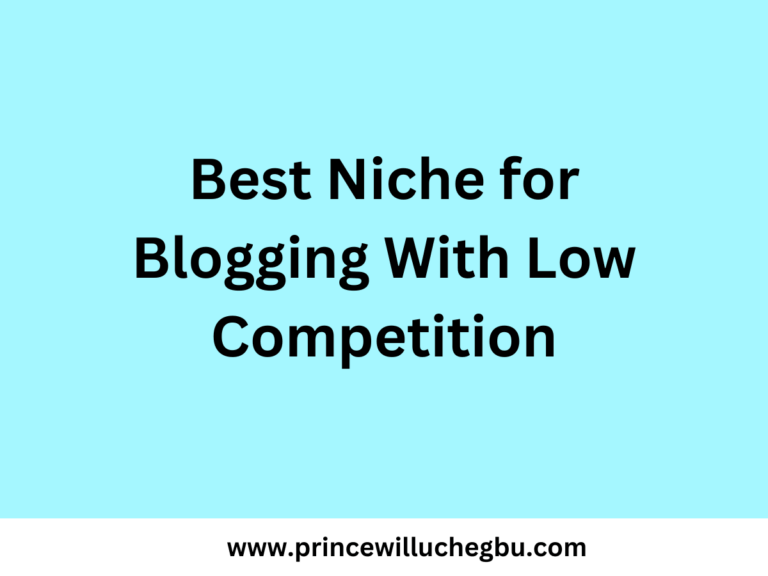6 Best Practices for Choosing a Domain Name
Your domain name can make or break your blogging journey. If users find the name offensive, you’ll have a difficult time convincing them to click through your displayed link on Search Engine Result Pages (SERPs). Hence, there is a need to ensure that your domain name resonates with the thousands and millions of website visitors.
Your domain name is simply your address on the Internet. As of today, there are over 350.5 million domains active on the internet. That’s huge!
When choosing your domain name, one of the best practices is to keep it separate from the existing 350.5 million domains. There should be a clear difference between your chosen name and that of others. Since Meta Platform owns Facebook.com as a registered domain, your own domain should be distinct from theirs.
So, instead of having Faceboook.com, which mimics Facebook.com and can lead to confusion, it’s far better to choose a clearly different domain.
Your domain is similar to your business name. However, unlike the business name, the domain name includes an additional feature known as the domain extension.
Take a look at these domains.
- facebook.com
- whitehouse.gov
- billgatesfoundation.org
- ox.ac.uk
You’ll notice that there’s something else after each dot(.). Those are known as domain extensions, and they are properly considered when choosing the best domain name.
Best Practices for Choosing a Domain Name
1. The domain extension
The domain extension for your blog has a way of communicating to users the purpose of the blog. Plus, it also tells a good story for regional-based searches.
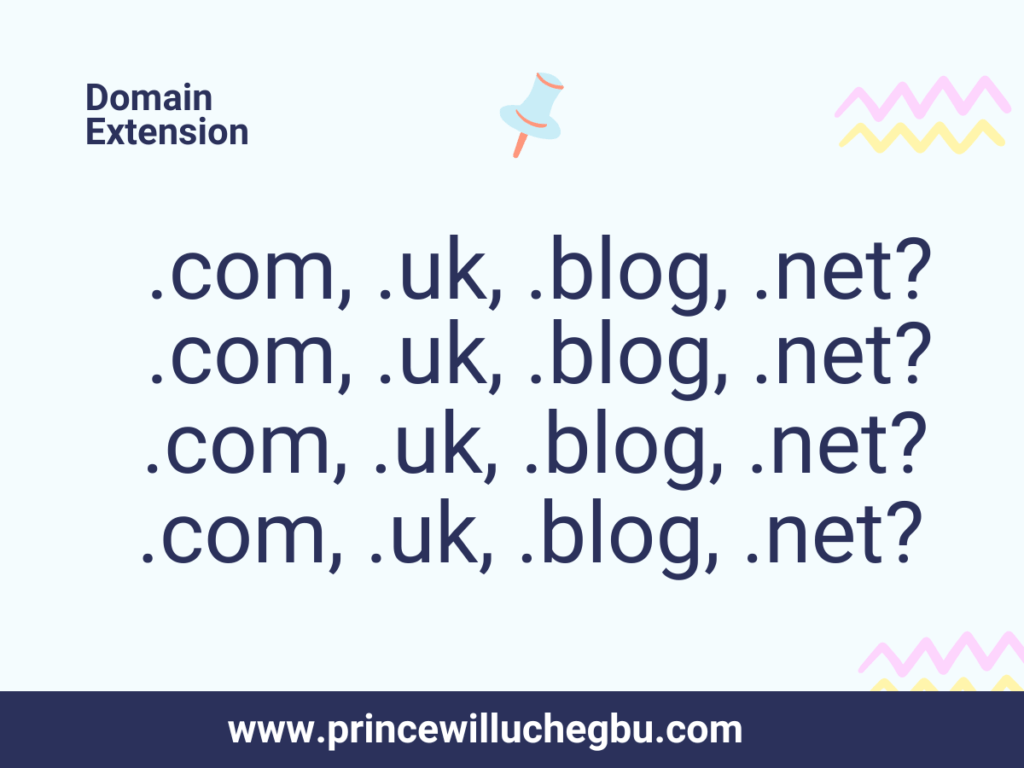
If you reside in a particular country and your blog is focused on serving the needs of people within that region alone, it may be best to use a domain extension that depicts the location of the blog.
Assuming your blog is dedicated to providing registration services for businesses in Nigeria through the Corporate Affairs Commission (CAC), using a domain like .ng or .com.ng can signify your presence in Nigeria.
But if you publish content or services that are relevant to the global market, a .com extension is a better option.
And if your blog is solely about AI updates, having a .ai domain appears more purposeful.
This should not be misconstrued as an immutable rule.
As of today, there are close to 1,600 different domain extensions available on the Internet Assigned Numbers Authority (IANA) Root Zone Database.
Domain extensions and their Meanings
- .com – Commercial: Originally intended for commercial businesses, it is now the most popular and widely used domain extension for all types of websites.
- .org – Organization: Typically used by non-profit organizations, charities, and advocacy groups.
- .net – Network: Initially intended for network-related organizations such as ISPs, but now used by a wide range of websites.
- .edu – Education: Reserved for educational institutions, primarily in the United States.
- .gov – Government: Used by government entities in the United States.
- .mil – Military: Reserved for the United States Department of Defense and its subsidiary organizations.
- .info – Information: Intended for informational websites.
- .biz – Business: Intended for business or commercial use.
- .us – United States: Country code top-level domain (ccTLD) for the United States.
- .uk – United Kingdom: ccTLD for the United Kingdom.
- .de – Germany: ccTLD for Germany.
- .jp – Japan: ccTLD for Japan.
- .cn – China: ccTLD for China.
- .fr – France: ccTLD for France.
- .in – India: ccTLD for India.
- .ca – Canada: ccTLD for Canada.
- .au – Australia: ccTLD for Australia.
- .io – Indian Ocean: Technically for the British Indian Ocean Territory but popularly used by tech startups and companies.
- .co – Colombia: ccTLD for Colombia, but commonly used as an abbreviation for “company.”
- .tv – Tuvalu: ccTLD for Tuvalu, often used by television and media companies.
- .me – Montenegro: ccTLD for Montenegro, often used for personal websites and blogs.
- .name – Personal Name: Intended for personal use, such as individual websites or blogs.
- .pro – Professional: Intended for professionals and related entities.
- .xxx – Adult Entertainment: Reserved for adult entertainment websites.
There are many other domain name extensions, including newer generic top-level domains (gTLDs) like .blog, .shop, .tech, and many more, each serving different purposes and communities. Country domain extensions are maintained by respective domain registrar.
Lastly, search engines like Google try to localize searches. When you seek regional-specific information, Google attempts to tailor your search by examining regional-specific domains, as it believes the information you seek is most likely to come from local residents.
Google believes a UK-based publisher should know more about UK-related information than a Belgian or Nigerian publisher.
2. Your Domain Name Should Be Short and Easy to Spell
Remember that these are not strict rules, but a guide for you.
If you look at the biggest brands, you can’t help but notice that they all maintain a very short domain name. Look at Facebook.com, Google.com, and Amazon.com. This is highly recommended so that users can easily remember your domain name.
When your domain name is short, it becomes much easier for users to spell.
You don’t want people to spend five hours typing your domain name. If the name is too long, people may spell it incorrectly.
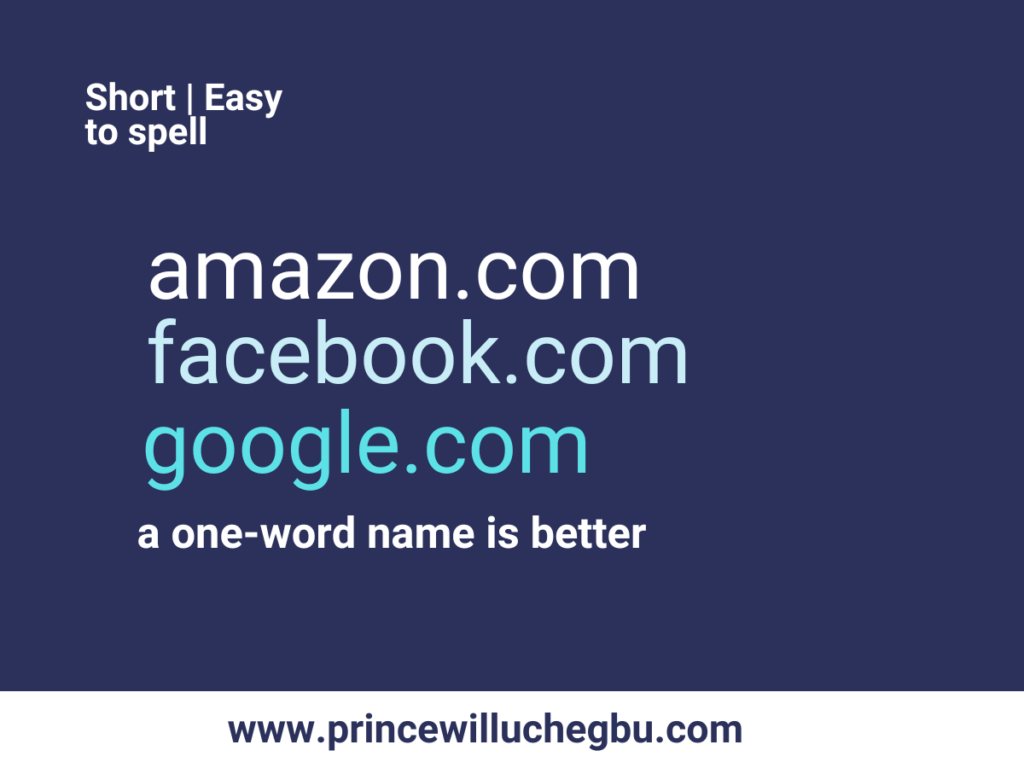
If possible, avoid using a traditional name. Use names that people can easily spell. So instead of using Ugukalabuzorepita.com, you should use something much easier for everybody to spell. This is particularly true if your target audience is the general public. But of course, if you are serving your region, your traditional people, or your cultural people, you can use a traditional name.
If I use something like Ugukalabuzorepita.com, an educated Igbo man or woman should be able to spell that easily.
3. Your Domain Name Should Not Be Generic
It should not be too common, either. It should not be a name that is too familiar.
For instance, I have a client whose brand name is Various Media. When I noticed that this person was no longer very active with us, I had to reach out to her.
Unfortunately, I just realized that her brand name is Various Media. And all our communication channels were not going through. Therefore, I turned to Google to research her website. Because the website was not included in the invoices we were sending to her in our payment channels. When I went to Google and typed Various Media, I quickly realized that it would be very difficult for me to locate her. Since the word Various Media is understood to mean different types of media outlets like the Vanguard, Forbes, Time, and Bloomberg, all the news channels. They are considered ‘various media’. I couldn’t locate her because the name was too generic.
- How to Start a Beauty Blog for Free [Expert Guide]
- 17 Reasons to Start Blogging [by an Expert]
- How to Start a Beauty Blog in 2024
- 8 Best Blog Hosting Companies in 2024
- How to Advertise Your Business on Whatsapp Status
Your domain name should not be easily associated with a lot of things. You want to appear unique and specific. I usually advise people to use a name so that whenever you search for it, you won’t have a lot of ideas popping up.
For example, if I go to Google and say my brand name is Various Media, you will notice that you have a lot of information already ranking for that particular idea. If your brand name is Various Media, scaling and ranking for it becomes extremely difficult.
You want a name that, whenever you search for it, you will have very few searches for. As soon as you start posting content on your blog, you can effortlessly dominate the search for that specific keyword.
4. Your Domain Name Should Be Memorable
Yes, people should be able to remember your name easily. They should be able to remember your name without struggling. A memorable domain is an ideal domain, especially one-word domains.
Blogging is a profitable career, if you follow the right blueprint. To get started, check out: How To Start and Make Money Blogging
5. Your Domain Name Should Not Be Offensive To Culture
Your domain name should be culturally sensitive. It should not be an aberration to any cultural norms or traditions. It should not be offensive to morals.
You really have to do that research to find out what the word means. If you’re using, for example, Facebook.com, does it represent an idea in a particular culture or tradition that is offensive? That is sacred, especially if you’re targeting that country.
If you’re targeting a particular country, the word ‘chi’ is related to ‘genitalia’, but your content and your blog do not focus on those ideas. It becomes really offensive.
So consider that your domain name is sensitive to culture, norms, and people’s beliefs.
6. Your Domain Name Should Be Suggestive
You really have to be futuristic when considering this idea to avoid getting trapped. For instance, if you’re talking about a business, it is usually advisable that your name suggest that particular business.
A sports blog should be something like sportblog.com or sportshub.com rather than onlinebusinesshub.com while focusing on sports.
Let’s say we are researching ‘how to start a blog’. In your search, you came across three domain names:
- syzhub.com.
- princewilluchegbu.com.
- startblogging.com.
Among the websites, which are you most likely to click to read about the topic ‘how to start a blog’?
Whenever I conduct research or pose a question, everyone consistently selects the last option: startblogging.com.
The reason is simple. The name of the blog lends credence to it. Our search indicates that the last one is the most dedicated and suitable to provide practical, first-hand knowledge about the topic.
When a domain is suggestive, it’s natural to assume that’startblogging.com’, being dedicated to blogging, should have better information than the other two websites. Because you don’t really know what their core focus is, right?
So your brand name or your domain name might be suggestive. In doing that, you also need to ensure that your name is not too broad. You need to make room for improvement.
If your blog name is ‘startblogging.com’, what if tomorrow you decide to expand your brand and you want to expand into other angles that don’t have to do with blogging?
You see now that it becomes a problem for you. Because, like we said before, people who are searching for ‘how to start a blog’, most likely want to click on’startblogging.com’.
But what if now you’re focusing on childcare?
If we search for ‘best approach to child care’, people become very skeptical about clicking on your domain because it says ‘start blogging’, when the person is searching for the ‘best approach to child care’. ‘Start blogging’ may not be a suitable domain for such specific information, as people often seek out blogs written by experts or owned by experts. Additionally, having this domain may limit your ability to expand your business.
Names that are not suggestive give you the ability to diversify without changing your brand name. Take a look at Amazon.com.
Amazon started as a bookstore—an online bookstore. Right now, Amazon is a technology company. They can easily diversify because the name does not suggest anything. Google can also diversify. Google started as a search engine. Right now, Google has over 50 different apps. If your name is suggestive, you may not be able to do all of that. It means that you have to change your domain name whenever you can to pivot.
Once you’ve chosen your name, the next thing is to confirm if that name is available.
To do that, go to any hosting company.
I’m going to use Bluehost. Locate domains and click on it. Enter the domain name you want to buy. Done? Search for it to see if it is available for registration.
Want to have an expert view on the monetary implication of starting a blog? See: How Muche Does It Cost To Start A Blog
So here, as you can see, it says bloggingwithprincewill.com is available.
Meanwhile, the system is also suggesting other names. Now, all hosting companies offer this service. You can always check out other hosting companies if you want.
FAQS | Best Practices for Choosing a Domain Name
How to Choose the Perfect Domain Name?
It should be short, easy to spell, and sometimes suggestive. Try as much as possible to avoid hyphens, confusing double letters, or alphabets that may be difficult to spell. Plus, it should not be offensive to cultural norms. Lastly, there are no perfect domains.
What Is the Best Practice Domain Naming?
Keep it simple, relatable, and descriptive of the business the domain represents if you’ve no intention to pivot. The name should be unique and not generic.
What to Consider When Getting a Domain Name?
Unique, non-confusing name, and brandable. If the name will create difficulty in brand recognition, it’s not a good name or similar to established brands.
What Constitutes a Good Domain Name?
I would say being nimble. Can the name survive different times and seasons? Does it give room for expansion without creating dissonance in the minds of existing readers? Is it distinct from other domains available, and can you rank for the name?
How to Choose a Domain for SEO?
It should be suggestive of the industry or topics the brand represents. If it’s a domain that will write about food blogging, possibly it should have the head keyword ‘food’ in it. This way, it sends a clear message to search engines and readers about the intent of the site.
Final Thought
Remember to keep it simple. In choosing your domain name, avoid letters that can lead to confusion in spelling. A typical example is having a double of a letter or word whose sound is different from the spelling (complex spellings). Also, avoid hyphens in your domain name.
Choose a name you’re proud of—a name that can boost your enthusiasm to make it work.
Lastly, pay attention to these when thinking of domain name ideas:
- Choose a brandable domain name. You can use online domain name generator or business name generator like Namelix to come up with potential domain names / premium domains.
- If you’re very concerned about search engine optimization like me, ensure the domain name (blog domain) contains relevant keywords.
- Ensure the domain name isn’t trademarked to protect your brand.
- You can also check the domain history to be sure the domain has not been used for any unethical practice.
- The name should be good for use in your social media platform.

